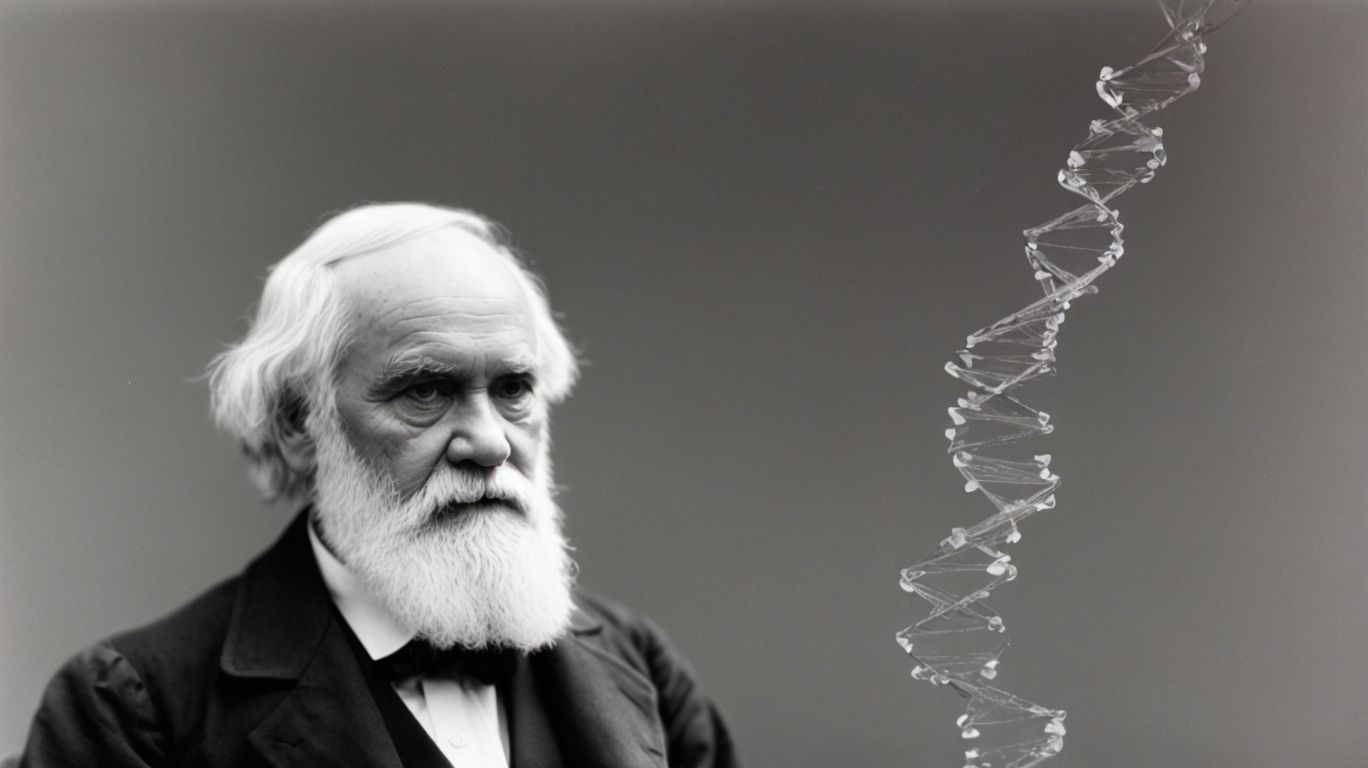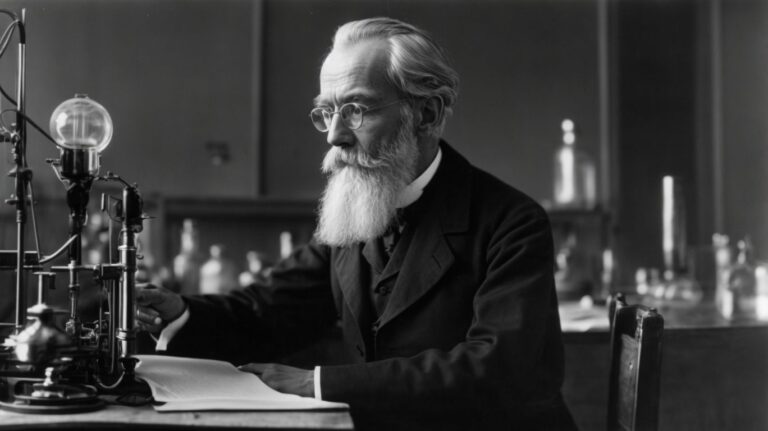Charles Darwin is a name that is synonymous with the theory of evolution. But his impact goes beyond just biology. His groundbreaking work has also had a profound influence on the field of psychology.
In this article, we will explore who Charles Darwin was, his theory of evolution, and how it has shaped the study of human behavior. We will also delve into the criticisms his theory faced and how it continues to shape modern psychology. From evolutionary psychology to ethical concerns, we will cover it all. So, let’s dive into the fascinating world of Darwin’s theory and its impact on psychology.
Contents
- 1 Key Takeaways:
- 2 Who is Charles Darwin?
- 3 What is Darwin’s Theory of Evolution?
- 4 How did Darwin’s Theory Impact Psychology?
- 5 What Criticisms did Darwin’s Theory Face in Psychology?
- 6 How has Darwin’s Theory Shaped Modern Psychology?
- 7 Frequently Asked Questions
- 7.1 What is the impact of Charles Darwin’s work on psychology?
- 7.2 How did Charles Darwin’s work change the way we view human behavior?
- 7.3 What specific aspects of psychology were impacted by Charles Darwin’s work?
- 7.4 Why is the concept of natural selection important in psychology?
- 7.5 Has Charles Darwin’s work had any controversial implications for psychology?
- 7.6 How has the impact of Charles Darwin’s work evolved over time in the field of psychology?
Key Takeaways:
- Darwin’s theory of evolution revolutionized the field of psychology, providing a new lens through which to understand human behavior and development.
- His work led to the emergence of evolutionary psychology, which examines how evolutionary principles shape psychological processes.
- Darwin’s theory sparked debates and criticisms in psychology, but it has also influenced modern psychology, from clinical practices to cross-cultural studies.
Who is Charles Darwin?
Charles Darwin, a pioneering figure in the scientific understanding of evolution, is best known for his groundbreaking work on natural selection and the theory of evolution.
Charles Darwin’s observations during his voyage on HMS Beagle to the Galapagos Islands in the 1830s provided the foundation for his theory of evolution. His meticulous notes and observations of various species, particularly finches and tortoises, greatly influenced his understanding of adaptation and species variation.
His seminal work, ‘On the Origin of Species’ published in 1859, introduced the concept of natural selection. This emphasized the process through which favorable traits are passed down to successive generations, leading to the divergence of species over time.
Darwin’s theory reshaped biological understanding, highlighting the interconnectedness of all life forms. It provided a comprehensive framework for explaining the diversity of life on Earth. His significant impact on the field of biology continues to resonate, shaping ongoing research and study in the scientific field.
What is Darwin’s Theory of Evolution?
Darwin’s theory of evolution, articulated in his seminal work ‘On the Origin of Species,’ proposed that species evolve over time through the process of natural selection, driven by environmental influences and variation within populations.
This concept is foundational to the understanding of biological diversity, adaptation, and the development of new traits within species.
Natural selection, as outlined by Darwin, is the mechanism through which nature selects the most advantageous traits for survival and reproduction, thereby shaping the characteristics of future generations. Gradual accumulation of small adaptive changes over successive generations forms the basis of evolutionary progress within species.
How did Darwin’s Theory Impact Psychology?
Darwin’s theory of evolution had a profound impact on psychology, particularly in understanding human behavior, emotions, and the influence of evolutionary history on cognitive and instinctual processes.
The theory advanced the idea that human behavior and emotions are not only shaped by societal and environmental factors but are also deeply rooted in our evolutionary past.
It prompted psychologists to delve into the dynamics of how our ancestral history has sculpted our cognitive processes, decision-making tendencies, and emotional responses.
This framework provided a deeper understanding of why certain behavioral patterns and emotional reactions are prevalent across diverse cultures, bolstering the concept of universal human nature influenced by evolutionary forces.
Evolutionary Psychology
Evolutionary psychology focuses on understanding human behavior and cognition through the lens of evolutionary history, exploring traits, intelligence, and behaviors shaped by the imperative of survival and the propagation of offspring.
This branch of psychology is rooted in the belief that many psychological mechanisms are the result of natural selection, serving specific functions that enhance an individual’s chances of survival and reproductive success.
Adaptation and natural selection play crucial roles in shaping human behavior, influencing aspects such as mate selection, social interaction, parental investment, and decision-making processes.
By examining how these behaviors may have provided an advantage in ancestral environments, for example, understanding risk, trust, and emotional responses, evolutionary psychology sheds light on the adaptive significance of psychological mechanisms.
Social Darwinism
Social Darwinism, influenced by Herbert Spencer, applied Darwin’s evolutionary theories to human societies, proposing that societal progress and success were determined by the inheritance of advantageous traits and the operation of natural selection in human populations.
This ideology gained traction in the 19th century, fostering the belief that societies, like biological organisms, evolve through competition, with the ‘fittest’ individuals or groups prevailing over the ‘weaker’ ones.
It posited that interference in this natural process would hinder societal progress, giving rise to notions of laissez-faire capitalism and colonial imperialism as means to perpetuate the evolutionary advancement of certain societies.
Social Darwinism’s influence extended to fields such as politics, economics, and even eugenics, shaping public policies and justifying various forms of discrimination.
Nature vs. Nurture Debate
The nature vs. nurture debate, prompted by Darwin’s evolutionary theories, delves into the interplay between genetic influences and environmental factors in shaping individual behaviors, cognitive processes, and psychological development.
The complex relationship between genetics and the environment has long intrigued psychologists and researchers. They seek to understand how these two factors work together to shape human characteristics.
Charles Darwin’s impact on psychology is undeniable, as his work laid the foundation for exploring the role of nature and nurture in shaping personality, intelligence, and mental health.
Numerous studies have shown that genetic predispositions can influence the likelihood of developing certain mental disorders. However, environmental factors such as upbringing, education, and social interactions also play critical roles in determining psychological well-being and behavior.
Developmental Psychology
Darwin’s theories have significantly influenced developmental psychology, providing insights into the biological and environmental influences on human development, behavior, and cognitive intelligence.
The concept of natural selection, expounded by Darwin, has shaped the understanding of human development by emphasizing the adaptation of individuals to their environments.
This has led to the exploration of the interplay between genetic predispositions and environmental factors in shaping human behavior and cognitive functions.
Furthermore, Darwin’s theories have sparked research into the evolutionary roots of human emotions, social behavior, and language development, fostering a multidimensional perspective on the intricate mechanisms underlying human development.
Animal Behavior Studies
Darwin’s pioneering work has spurred extensive research in animal behavior studies, shedding light on instinctual behaviors, emotional expressions, and consciousness in various species through meticulous observations and empirical evidence.
His observations and writings, notably in ‘The Expression of the Emotions in Man and Animals,’ provided a foundation for understanding the commonality of emotional responses across species.
This groundbreaking work paved the way for in-depth studies on the instinctual behaviors that drive survival and adaptation in the animal kingdom.
Darwin’s emphasis on the role of consciousness in shaping behavior has prompted modern studies to explore the cognitive abilities of animals, leading to discoveries that challenge traditional notions about animal intelligence and self-awareness.
The impact of Darwin’s work continues to reverberate in the field of animal behavior, fostering a deeper understanding of the interconnectedness and complexity of emotional expressions and behaviors across diverse species.
What Criticisms did Darwin’s Theory Face in Psychology?
Despite its influence, Darwin’s theory faced criticisms in psychology, including concerns about reductionism, ethical considerations, and the demand for empirical evidence supporting evolutionary explanations of human behavior.
One of the primary criticisms of Darwin’s theory in psychology is its reductionist perspective, which is the belief that complex phenomena can be explained by reducing them to simpler components.
Critics argue that this approach oversimplifies the complexities of human behavior and cognition, overlooking the intricate interplay of biological, social, and environmental factors.
Ethical concerns have also been raised regarding the application of evolutionary principles to explain behavior, particularly in terms of justifying certain social inequalities or discriminatory attitudes.
Critics caution against using evolutionary explanations to perpetuate harmful stereotypes or behaviors.
Skeptics emphasize the importance of empirical evidence to support evolutionary explanations in psychology.
They argue that while evolutionary perspectives offer valuable insights, it is crucial for hypotheses and theories to be rigorously tested and validated through empirical research to establish their credibility and relevance in understanding human behavior.
Reductionism
Reductionism in the context of psychology critiques the oversimplification of complex behaviors and cognitive processes through exclusively relying on evolutionary theories of adaptation and environmental influences.
Evolution and environment are key factors in shaping human behavior, but reducing explanations to these alone can limit our understanding.
By focusing solely on these factors, we may overlook the complex interplay of biology, psychology, and socio-cultural influences.
This approach may also ignore the diversity of individual experiences and the intricate nature of psychological phenomena like emotions, learning, and memory.
Ethical Concerns
Ethical concerns in psychology arise from the potential implications of applying evolutionary theories to human behavior, particularly in the areas of social influences, moral development, and the scientific understanding of ethical decision-making.
When considering the application of evolutionary theories to psychology, it becomes apparent that this approach can significantly influence our understanding of human behavior within social contexts.
The potential ethical considerations extend to how these theories may shape our understanding of moral development and decision-making processes.
The implications for social influences may prompt a reevaluation of how ethical principles are integrated into psychological research and practice, raising questions about the potential impact on individual autonomy and societal well-being.
Lack of Empirical Evidence
The lack of comprehensive empirical evidence was a criticism leveled against Darwin’s theory in psychology, demanding rigorous observations and population studies to support the evolutionary explanations of human traits and behaviors.
This critique emphasized the necessity of robust empirical research to substantiate the claims of evolutionary psychology. Critics argued that while the theoretical framework proposed by Darwin and subsequent psychologists was compelling, it lacked substantial empirical validation.
They stressed the importance of conducting longitudinal studies and cross-cultural research to establish the universality of human behaviors and traits.
The call for population-based studies aimed to address concerns about generalizability and the potential biases in small-scale observational studies. The Impact of Charles Darwin’s Work on Psychology further supports these endeavors.
How has Darwin’s Theory Shaped Modern Psychology?
Darwin’s theory has significantly shaped modern psychology, extending into evolutionary psychology in clinical settings, the understanding of human behavior through evolutionary history, and its influence on cross-cultural studies.
This enduring impact of Darwin’s theory has proven to be pivotal in shaping the field of psychology, especially through the emergence of evolutionary psychology in clinical contexts.
The application of evolutionary principles in clinical settings has provided valuable insights into the understanding of human behavior, offering a nuanced perspective that considers the impact of natural selection and adaptation.
The integration of Darwin’s theory has contributed to a deeper comprehension of human behavior through evolutionary perspectives, shedding light on the adaptive significance of psychological phenomena.
The influence of Darwin’s theory on cross-cultural studies has been instrumental in fostering a more holistic understanding of human behavior, recognizing the interplay between evolutionary processes and cultural diversity.
Evolutionary Psychology in Clinical Settings
Evolutionary psychology has found applications in clinical settings, providing insights into the influences and adaptive traits that underpin human behavior and psychological well-being within the context of evolutionary history.
This application of evolutionary psychology in clinical settings offers a deeper understanding of various psychological phenomena.
By examining the evolutionary origins of certain behaviors, therapists and clinicians can better comprehend the underlying mechanisms of anxiety, stress, and depression.
Understanding these adaptive traits not only enhances diagnosis but also informs tailored treatment approaches. Acknowledging our evolutionary history enables exploration of how social structures, mate selection, and attachment systems contribute to mental health challenges.
Understanding Human Behavior through Evolutionary History
Darwin’s theory has facilitated a deeper understanding of human behavior by diving into the influence of evolutionary history, the interplay between adaptation and environmental influences, and the shaping of psychological traits in different populations.
This perspective has shed light on the intricate connections between genetic predispositions and behavioral patterns, offering insight into the complexities of human cognition and social dynamics.
It emphasizes the adaptive significance of certain behavioral tendencies and the ways in which they have evolved to enhance survival and reproductive success.
Influence on Cross-cultural Studies
Darwin’s theory has influenced cross-cultural studies within psychology, informing the exploration of inherited traits, cultural variations, and the scientific understanding of psychological phenomena across diverse populations.
This framework has allowed psychologists to delve into how evolutionary processes might shape behavior and cognition in different cultural contexts, shedding light on the interplay between genetic predispositions and environmental influences.
It has prompted researchers to examine how cultural norms and practices can impact the expression of psychological characteristics, emphasizing the need for a more comprehensive and inclusive approach to studying the human mind in various societies.
Frequently Asked Questions
What is the impact of Charles Darwin’s work on psychology?
Charles Darwin’s theory of evolution and natural selection has had a profound impact on the field of psychology. By emphasizing the importance of adaptation and survival, his work challenged traditional beliefs about human behavior and paved the way for a more scientific approach to understanding the mind and behavior.
How did Charles Darwin’s work change the way we view human behavior?
Before Darwin’s work, many believed that humans were fundamentally different from other animals and that behavior was primarily driven by innate, unchangeable factors. However, his theory of evolution showed that humans are part of the natural world and that behavior is shaped by environmental pressures and the need to adapt.
What specific aspects of psychology were impacted by Charles Darwin’s work?
Darwin’s work had a significant impact on a variety of areas in psychology, including developmental psychology, social psychology, and evolutionary psychology. His theories provided a framework for understanding how behavior develops, how individuals interact with one another, and how evolutionary mechanisms influence behavior.
Why is the concept of natural selection important in psychology?
The concept of natural selection, which is a central component of Darwin’s theory, is important in understanding human behavior because it highlights the role of environmental pressures and adaptations in shaping behavior. It also emphasizes the idea that behavior is not fixed or predetermined, but rather can change over time in response to changing circumstances.
Has Charles Darwin’s work had any controversial implications for psychology?
Yes, there have been controversial implications of Darwin’s work for psychology. One example is the use of evolutionary psychology to explain gender differences in behavior, which has sparked debate and criticism. However, his work continues to be a crucial foundation for understanding human behavior and has led to important advancements in the field of psychology.
How has the impact of Charles Darwin’s work evolved over time in the field of psychology?
While Darwin’s work was initially met with resistance in the field of psychology, it has since become an integral part of the discipline. His ideas have continued to influence and shape research and theories in psychology, and his work remains relevant and important in understanding human behavior today.




